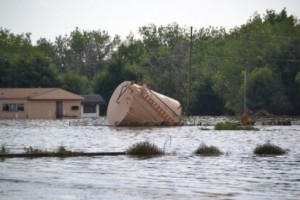Widgetized Section
Go to Admin » Appearance » Widgets » and move Gabfire Widget: Social into that MastheadOverlay zone
Local legislator vows ‘harder questions’ about oil drilling in wake of flooding spills
A little more than one month after torrential rains and flood-swollen rivers ripped through the heart of Colorado’s drilling infrastructure along the state’s northern Front Range, it’s clear there will be a great deal of discussion about better safeguards to prevent future oil spills when the State Legislature convenes early next year.
The Colorado Oil and Gas Conservation Commission (COGCC) as of Oct. 8 was tracking 13 “notable releases” of oil totaling 43,134 gallons in the flood-impact zone (mostly Weld County), and 17 releases of produced water totaling 26,385 gallons. Inspectors for the state’s lead oil and gas drilling regulatory agency had evaluated 1,355 well sites, or approximately 80 percent of the flood-impact zone.
The amount of oil released in the flooding, much of which spilled from damaged storage tanks, is equivalent to more than three full, 300-barrel storage tanks, and there are 42 gallons of oil in one barrel. State health officials who have been testing the flood waters announced last week that most of the oil has either dissipated or evaporated.
However, state Rep. Diane Mitsch Bush, a Steamboat Springs Democrat who represents Vail and surrounding Eagle County, said she’s concerned about how oil and gas companies monitor their drilling operations in disaster situations. She plans to take up the issue, as well as the topic of expanded setbacks for drilling near water sources, during the next legislative session.
“We really need to take a look at [monitoring] because several companies were quite confident their remote monitoring of condensate tanks would pick up spills, so I need to delve into that more and ask harder questions,” said Mitsch Bush, who last session successfully passed a bill requiring 24-hour notification to the state and local officials of spills in excess of one barrel.
COGCC spokesman Todd Hartman last week said the state is not “aware of circumstances that would warrant citing operators for violations and issuing penalties” for spills in the flood zone near the South Platte and St. Vrain rivers, but he added that could change.
All of the companies that reported spills did so as soon as they were aware of the problem, officials say. However, because of the widespread flooding, which knocked out roads, damaged equipment and limited access, operators often did not know about the spills within 24 hours.
“Regulators and industry remain in emergency response mode, and people are working very long hours to understand the facts of the releases and potential impacts and are working to repair infrastructure damage safely and bring production back online safely,” Hartman said.
“Enforcement is a very important element of our program, but it is not the higher priority during a time of emergency response. When time permits, we will evaluate all the facts and circumstances and will investigate as or if necessary and act as circumstances warrant.”
Gary Wockner of Clean Water Action says there should be a ban on all future drilling and hydraulic fracturing (fracking) in 100-year floodplains, and better safeguards and warning systems for drilling already occurring in such areas.
“All of the wells that are already in 100-year floodplain and near water sources need significantly more regulation, including but not limited to remote monitoring and shut-off capacity, tank security so they don’t float away, borehole integrity when flooding occurs, and increased inspections,” Wockner said.
Mitsch Bush says better monitoring should be explored.
“All the condensate tanks tend to be remote monitored and, mea culpa, I didn’t look closely enough at how that actually works,” she said. “So I, as a legislator representing you, need to better understand that, and that’s one of the things I want to talk to the industry representatives about once the emergency phase is taken care of.”
State health officials last week reported no hydrocarbons in the flood waters, but did find high levels of E. coli from the millions of gallons of raw sewage that spilled. Oil and gas industry officials said their emergency plans, which included shutting in wells and booms and other cleanup procedures, worked in the wake of the disaster.
“[The floods] resulted in millions of gallons of water contaminated with sewage from waste treatment failures, animal waste from farms and processing plants, oil and gas products from facilities and abandoned motor vehicles, household waste and chemicals from damaged and destroyed homes, and much more,” said Doug Flanders, director of policy and external affairs for the Colorado Oil & Gas Association. “For such emergencies, industry has in place procedure plans they train for.”
But Pete Maysmith, executive director of Conservation Colorado, said those plans need to be examined in the wake of the flooding.
“Among the wreckage are tens of thousands of gallons of spilled oil and damage to oil and gas wells, drilling sites, and tanks,” Maysmith said. “We all know oil and gas products and bi-products can have long-term impacts to wildlife, water, and public health.
“Unfortunately, sometimes it takes a disaster to remind decision-makers that a heavy industrial activity like oil and gas drilling needs to have adequate disaster response plans in place before the waters rise.”
David O. Williams
Latest posts by David O. Williams (see all)
- In governor’s primary race, Bennet, Weiser sparring over who is tougher on Trump - July 15, 2025
- The O. Zone: Battle for public lands just now heating up, much like our atmosphere - July 14, 2025
- Immigrant rights groups push Colorado AG Weiser for probes into violations of ICE collaboration law - July 11, 2025



